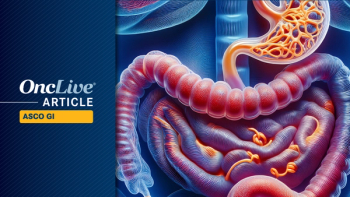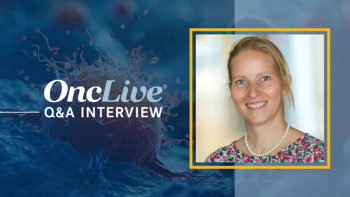
Cemiplimab Elicits Antitumor Activity in Metastatic Basal Cell Carcinoma
November 12, 2020 - Cemiplimab demonstrated clinically meaningful antitumor activity, including durable responses, and acceptable safety in patients with metastatic basal cell carcinoma after progression on or intolerance to hedgehog inhibitors
Cemiplimab (Libtayo) demonstrated clinically meaningful antitumor activity, including durable responses, and acceptable safety in patients with metastatic basal cell carcinoma (mBCC) after progression on or intolerance to hedgehog inhibitors, according to findings from the prespecified interim analysis of the mBCC cohort of a phase 2 trial (NCT03132636) that were presented ahead of the 2020 SITC Virtual Congress.
Among 28 patients, the objective response rate (ORR) per independent central review (ICR) was 21.4% (n = 6; 95% CI, 8.3%-41.0%), which consisted of all partial responses (PRs). The stable disease (SD) rate was 35.7% (n = 10), which translated to a disease control rate (DCR) of 67.9% (95% CI, 47.6%-84.1%).
“There have been case reports with cemiplimab, but this is the first prospective study in any meaningful number of patients. The activity and durability [of the agent] seem to be promising,” said Karl Lewis, MD, lead study author, and professor of medicine-medical oncology at the Colorado School of Medicine, in a virtual press briefing ahead of the 2020 SITC Virtual Congress.
BCC is the most common type of skin cancer and ultraviolet exposure is a significant risk factor. The majority of patients with advanced BCC undergo curative surgery. However, systemic therapy is also available for patients with advanced disease who are ineligible for curative surgery or radiation.
Vismodegib (Erivedge) is an oral hedgehog inhibitor that is currently approved for patients with mBCC. However, no FDA-approved treatment options are available to patients who progress on or are intolerant to hedgehog inhibitors.
Cemiplimab, a PD-1 inhibitor, is the first systemic therapy that has shown clinical benefit in patients with locally advanced and mBCC after treatment with hedgehog inhibitors. The first demonstration thereof was reported in findings from the locally advanced cohort of this phase 2 study, which were presented during the 2020 ESMO Virtual Congress.
The phase 2 study enrolled 2 cohorts. Group 1 consisted of patients with nodal and distant mBCC, and group 2 comprised patients with locally advanced BCC (n = 84).
The mBCC cohort included patients with the opportunity to be followed for approximately 57 weeks to provide an ORR with a 95% confidence interval (CI).
Patients received 350 mg of intravenous cemiplimab every 3 weeks for up to 93 weeks. Tumor assessments were performed on days 1 to 5 every 9 weeks and on days 6 to 9 every 12 weeks thereafter. Tumor response assessment was measured by ICR, using RECIST 1.1 criteria for visceral lesions or modified World Health Organization criteria for skin lesions.
ORR per ICR served as the primary end point of the study. Secondary end points included ORR by investigator review, progression-free survival (PFS), PFS by ICR and investigator review, overall survival, complete response (CR) rate by ICR, and safety and tolerability of cemiplimab.
Regarding prior therapy in the mBCC cohort, 100% of patients received vismodegib (n = 28), 10.7% (n = 3) received sonidegib (Odomzo), and 10.7% (n = 3) received vismodegib and sonidegib. Reasons for discontinuation of prior therapy included disease progression on hedgehog inhibitor therapy (75.0%; n = 21), prior hedgehog inhibitor intolerance (n = 10; 35.7%)––predominantly for vismodegib (n = 11; 39.3%) vs sonidegib (n = 2; 7.1%)––and SD as best response after 9 months on hedgehog inhibitor therapy (n = 5; 17.9%).
Additional findings from the mBCC cohort indicated that 10.7% of patients (n = 3) achieved non-CR and non-progressive disease, and 25.0% of patients (n = 7) experienced progressive disease. Less than 10% of patients (n = 2; 7.1%) were not evaluable.
The median duration of response (DOR) had not been reached at the time of data cutoff. The 6- and 12-month DOR estimates were 100% (95% CI, 68.3%-97.6%) and 66.7% (95% CI, 19.5%-90.4%), respectively.
All 6 responses were ongoing at 1 year of treatment and had observed duration of at least 8 months.
The safety profile of cemiplimab was found to be consistent with prior reports of the agent in other tumor types. The most common any-grade treatment-related adverse effects (TRAEs) occurred in 78.6% of patients (n = 22). Grade 3 or greater TRAEs were reported in 17.9% of patients (n = 5), and 1 death from staphylococcal pneumonia occurred, which was determined to be unrelated to study treatment.
In previously presented findings of the locally advanced BCC cohort, cemiplimab led to an ORR of 31.0% (95% CI, 21.3%-42.0%), which included a 6% CR rate (n = 5) and a 25.0% PR rate (n = 21). Additionally, just under half of patients (48.8%; n = 41) achieved SD, translating to a DCR of 87% (95% CI, 60%-98%) in PD-L1–positive patients (PD-L1 ≥1%) and 77% (95% CI, 60%-90%) in PD-L1–negative patients (PD-L1 <1%).
“In the locally advanced cohort, responses to [cemiplimab] seemed to be delayed. Unlike cutaneous squamous cell carcinoma, for which cemiplimab is approved, those patients that respond seem to respond quickly, whereas in patients with basal cell carcinoma, there seems to be a time lag. Hopefully, with longer follow-up, this [21.4%] response rate might improve,” said Lewis.
In the locally advanced cohort, the median DOR per ICR had not been reached at the time of data cutoff. The 6- and 12-month DOR estimates were 90.9% (95% CI, 68.3%-97.6%) and 85.2% (95% CI, 60.5%-95.0%), respectively.
With regard to safety, the most common TRAEs were fatigue (25%; n = 21), pruritus (14%; n = 12), and asthenia (14%; n = 12). The most common grade 3 or greater TRAEs were fatigue (n = 2), colitis (2%; n = 2), autoimmune colitis (2%; n = 2), and adrenal insufficiency (2%; n = 2).
Fourteen patients (17%) discontinued treatment due to any-grade treatment-emergent AEs.
In conclusion, Mario Sznol, MD, professor of medicine and co-director of Yale SPORE in Skin Cancer at Yale Cancer Center, and co-moderator of the press briefing, offered some perspective on the study, stating, “This is really an important advance for these patients. [As we know], any new therapeutic has substantial clinical significance.”
Reference
Lewis KD, Peris K, Sekulic A, et al. Interim analysis of phase 2 results for cemiplimab in patients with metastatic basal cell carcinoma (mBCC) who progressed on or are intolerant to hedgehog inhibitors (HHIs). Presented at: SITC Virtual Congress; November 9-14, 2020. Poster: 428.


































